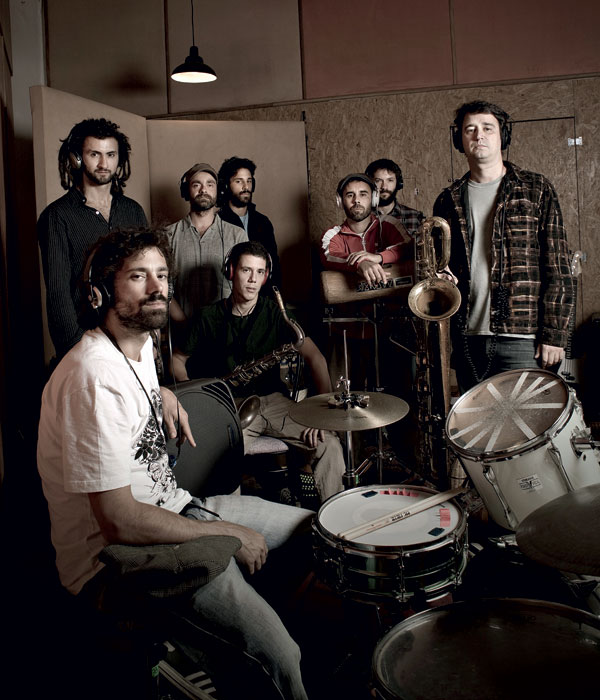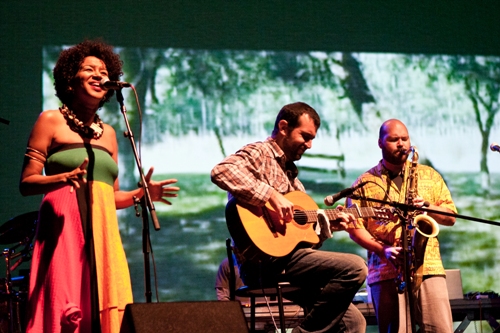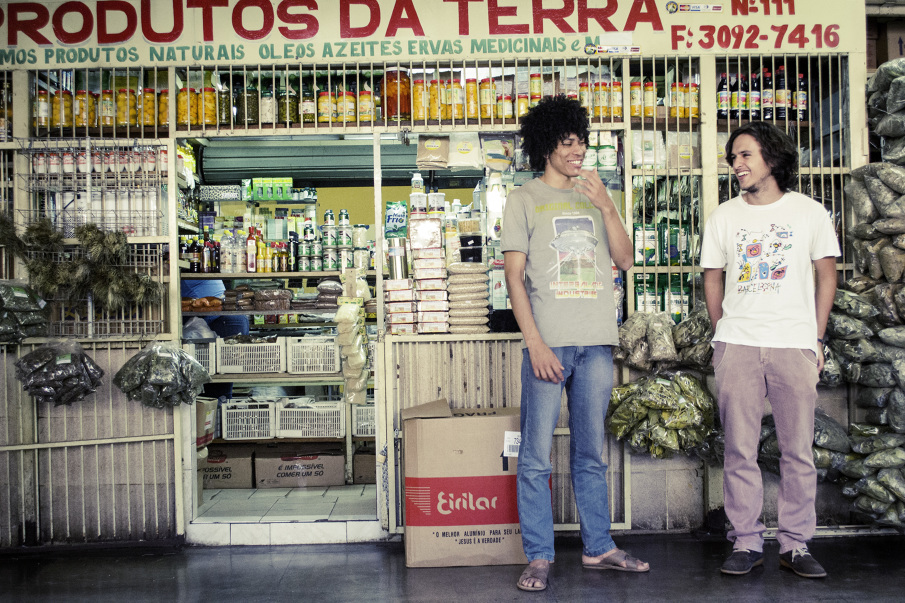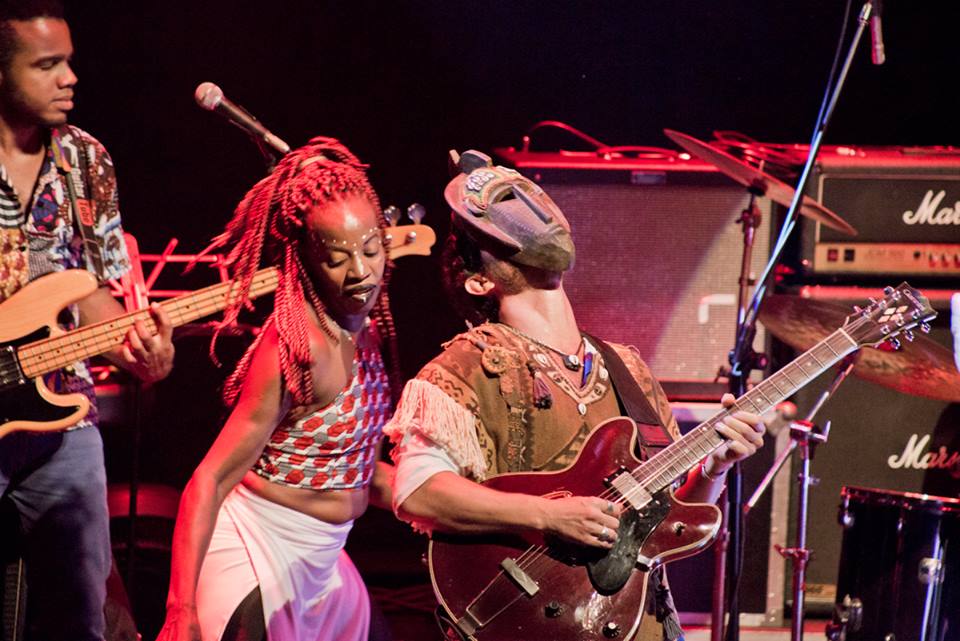As part of our mixtape series, we recently reached out to Brazilian journalist Marcelo Monteiro (contact him at mmonteiro@corp.globo.
Sam Backer: Tell me about yourself: Where did you grow up? How did you get involved in promoting alternative Brazilian music?
Marcelo Monteiro: I'm 42 and a journalist for Globo.com, a news-sports-entertainment portal for the biggest media company in Brazil, Globo. It's hard news, but fun, like editing the first page of a newspaper. And there's music!
I write for the blog Amplificador [amplifier] with three other journalists from O Globo that's completely focused on new Brazilian bands. We run albums, videos, reviews, playlists and feature lots of good music. I quite like the name Amplificador because it summarizes the blog's main objective: to present new music and independent bands to a bigger audience.
We cover the '00s and '10s generation, mostly bands on their first album, hoping to play bigger gigs and reach a big audience online. It's a very special moment in Brazilian music and for the global music industry as well, with all the new Web tools—streaming, Soundcloud, YouTube, Vimeo, Facebook—and also the growth of EPs, vinyl, new festivals...it's a real pleasure to be involved!
My personal mantra is that good music has to circulate and reach as many people as possible. So we try to cover new bands, albums, gigs and festivals from all over Brazil. People are no longer obligated to listen what the radio and TV are presenting. There is a whole new generation that wants to listen to new bands and new sounds and we try to connect those bands with other bands, producers, fans and even the mainstream.
What kind of music did you first get interested in?
London in the mid-'90s was like a post-grad degree in world music, funk, grooves and jazz; the kind of music I have been appreciating most until now and which I concentrated on for my vinyl collecting and general research.
Of course there is the Brazilian music heritage, which is also very, very strong: the '80s' rock-BR with bands like Barão Vermelho, Titãs and Paralamas; a big list of national geniuses like Caetano Veloso, Gilberto Gil, Baden Powell; all the bossa nova artists, singers like Elis Regina, Rita Lee; all the poets of samba, like Cartola, and Monarco. It's a great and very rich country for music lovers.
I've worked at Globo.com for the last eight years and that was my official entrance into music journalism. I first started a personal blog called Oblogblack that covered Afrobeat, jazz, blues and grooves, before then being invited to start Amplificador.
The alternative Brazilian scene is incredible prolific. Rio and São Paulo always have dozens of great bands, lots of new talented musicians. But the good news is that production is now massive all around Brazil,. The new Brazilian scene is definitely not concentrated only in Rio and SP; in fact, the most verdant scene today in the whole country, in my opinion, is in Rio Grande do Norte, in the northeast area. It's our Nordeste or beach paradise, and Natal is the capital of this state, but there are also very strong scenes in Pernambuco and Bahia. The state of Goiás, specifically the rock city of Goiânia in the central part of Brazil, near the country's capital, Brasília, is also big now.
The new Web-research generation is very influenced by music from all over the world, and we have incredibly rich mixtures of our own cultural traditions in popular art. That is how Mangue Beat started, for example. The '90s Pernambuco art-social movement was inspired by coco, maracatu and forró, all mixed with modern riffs and grooves. The mythical revolutionary Chico Science, who died in a car accident in 1997, his Nação Zumbi, Mundo Livre, Siba, and many others do this blend perfectly. There are also the references to the older generations and masters—Gil, Caetano, Luiz Gonzaga, João Gilberto, Tim Maia, Jorge Benjor—as a constant inspiration for all bands.
[caption id="attachment_22184" align="aligncenter" width="600"] Bixiga 70[/caption]
Bixiga 70[/caption]
The Amplificador challenge at a big site like O Globo is to make sure all these new bands circulate to the largest number of people possible. The new music market creates essential Web tools, but also new difficulties. The competition is huge! It feels like everyday there is a new album, EP, video or crowdfunding project. The musician has to work really hard creating, producing and promoting, but, at the same time, there are also new chances to reach people who are tired of the radio and TV's pop choices. People want new bands, and more, they want to see them on the stage and to consume videos, docs, digital albums... it's a big, big market; technology bridges between this incredibly large number of new bands and the audience that is now much more free to decide.
Can you explain the term "Novíssima Música Brasileira?" When did it start to be used? Who are the most important artists?
We started using it on Amplificador as a journalistic way to summarize the new bands of the '10s—a connected, digger, independent, eclectic, mixer machine generation. And very importantly, totally full of bands from all over Brazil.
Groups like Boogarins, Luziluzia and Carne Doce, from Goiânia, Far From Alaska, Camarones, Kung Fu Johnny, from Natal; Metá Metá, Passo Torto, Bixiga 70, Thiago Pethit from SP; Supercordas, Abayomy, Fino Coletivo, Ava Rocha, in Rio; in Paraíba there is Burro Morto, Pernambuco with Joseph Tourton, Jam and Zulumbi. They have all a maximum of five years on the road, most are on their first or second album. Boogarins and Far From Alaska (for me, tops among the new bands along with Metá Metá and Bixiga 70) have just released their first official albums following EPs (another concept that's big with this '00s generation).
I could list 20 new good bands of today, but I don't know how many of then will last till their fifth album. The market is still very very difficult, but I see new ways to survive in music industry: doing gigs all year and, better, creating albums without the obligation to appeal to the mainstream.
And this is where the promoting and filtering work of journalists, blogs and some TV and radio programs are important. We do this work at Amplificador together with lots of great journalists in Brazil including blogs like Scream & Yell, Rock'in'Press, Matéria, Urbe, Só Pedrada, Tenho Mais Discos que Amigos. Amplificador works as a platform for new music where you can listen very good, innovative bands and try to keep up with the incredibly big number of new albums, EPs and videos.
How does it connect to the older MPB style? What are the most exciting groups you know of in Brazil right now?
I did a list of 50 bands (below) with a brief style resume and number of likes on Facebook to give an idea of their audience. Hyped singers like Céu and Vanessa da Mata with little more than 10 years of work and with mainstream acceptance are on top. Also Nação Zumbi, which a lot of people say is the best Brazilian rock band of the last 20 years, and they are still very connected with an indy audience. I included them to give a more complete view, but the majority are bands were formed after 2005-10. And then I also chose 36 to put on the mix. It shows a completely eclectic generation, with even regional scenes having multiple faces. In fact, this is totally expected in a continental country mixed with so many cultural influences. What decides the band's groove will be the personal ingredients and how the musicians moves in that melting pot. A rich pot!
[caption id="attachment_22185" align="aligncenter" width="500"] Metá Metá[/caption]
Metá Metá[/caption]
The most exciting groups in the must-listen list are Boogarins, Far From Alaska, Bixiga 70 and Metá Metá; those four are on top. Very near, in this top 10, are bands from the new scene of BR-Afro-grooves: the excellent Abayomy, Iconili, André Sampaio and Afromandinga, Jam da Silva and Zulumbi; also the frenetic rock of O Terno, the incredible voices of Ive Seixas, Ava Rocha, Tulipa Ruiz and Karina Buhr; the grooves of BNegão and Siba, the psychedelic Luziluzia and Supercordas; the blues-rock of Muddy Brothers, Baggios, rap-groove of Criolo. The connection with the icons of samba in MPB and BR-Rock and all the older MPB style, is always very strong. Ney Matogrosso has just played an Abayomy concert in Fela Day in Rio. Mariana Aydar recorded with Zeca Pagodinho, BNegão with Wilson das Neves, Caetano did his last albums with a band formed only with musicinas aged around 30-40. Brazil is the country of mixtures, all the time. It's our essence!
In the U.S. music press, we've heard a lot about Brazilian electronic styles like brega and baile funk lately—are they popular in Brazil? What is the relation of Novíssima Música Brasileira and the other styles? Do the artists ever interact?
Brega, the Rio baile funk, as well as the strong rap scene in SP, guitarrada, tecnobrega and eletromelody from Para—all of these popular scenes, majority from poor areas of the capitals, are really huge.
I live in Rio and since the '80s the Miami-bass funk has been really big, maybe not popular enough style to reach TV or mass radio, but their massive beats are still everywhere. Brega is an old popular style, first tacky, cheesy, then cult! The same way with tecnobrega. Gaby Amarantos from Pará became a TV star.
Now, the hype in Rio favelas is passinho. It's an unbelievable dance with some movements from B-boys and Frevo (Nordeste again!) with the grooves from rap and funk. Recently a group formed with some of the best passinho dancers presented in Lincoln Center along with a new documentary about the scene.
https://www.youtube.com/watch?v=oM9bSYj17gM
http://lc.lincolncenter.org/shows/210656?show_date=2014-07-22%2018:30:00
Novíssima Música Brasileira is definitely not popular. We have good audience on the Web, at shows, festivals, bars, parties, but it's still very small for the size of country. There are some new bands inspired by brega, funk and technomelody; Gaby Amarantos, Gang do Eletro and Felipe Cordeiro are completely based off the Pará traditions. Bonde do Rolê is totally Rio funk.
Brazilian popular music is famous for its regional differences. Has the Internet done much to collapse these differences? Are the different styles still connect to local folkloric traditions?
That's a good point: Since the Internet gave us the freedom to listen what we want, it's a question of research. Sites and blogs are a real paradise for those who want to find new music and also old stuff—some never even released, like the African treasures, Orchestre Poly-Rythmo, for example—top five among my all-time favorite bands!). I agree that could be a risk, but there is so much to listen to and so many influences that its almost impossible to make a continental country like Brazil have a uniform production. I still see very pronounced differences between the scenes of Rio, SP, Natal, Goiânia, Belo Horizonte, Belém.
Of course there are the cultural differences that aren't going away. Nação Zumbi is completely Pernambuco, Fino Coletivo is Rio, Metá Metá and Criolo are totally São Paulo, sometimes it's obvious, although maybe not for people outside Brazil. But there is also big differences inside each city. So I don't think the Web will collapse the differences. What we have now are new ingredients to make a even better mixture.
What do you see as the future for this style in Brazil? How about internationally?
That is, for me, the main point and challenge. In the last 10 years, the Brazilian government started to see this internationalization of culture as a strategic objective. There are some very good public projects and big investment.
For music specifically there is the BME (Brazil Music Exchange) organizing events and media actions. We have also labels launching new Brazilian albums in U.S. and Europe. It's great, but unfortunately very small. If it's difficult to listen new Brazilian bands on Rio-SP radio stations and TV channels, then imagine abroad!
But at the same time the independent music market is still small here, but it's huge on the Internet! And with very good prospects. After three years with thousands of posts, EPs and videos, we and a London-based label are about to release Far Out, the first Amplificador compilation—an 18-track album with the very good rock-Afro-groove bands of Novíssima Música Brasileira. Our goal now at Amplificador is to make these new sounds circulate also abroad. Internationalization is a big challenge for the whole music industry, including bands, labels, producers and researchers. Metá Metá played in London in January and it was incredible—great reviews, packed concerts. Boogarins did a six-month tour playing in Spain, France, U.S., big festivals, small gigs. That's the new market for music. And it is really big!
The Amplificador compilation is the first step for us. Our plan is to reinforce this international bridge by writing, filtering and promoting the whole scene. We have great music, awesome bands and new media tools. Let's see what happens.
[caption id="attachment_22186" align="aligncenter" width="905"] Boogarins[/caption]
Boogarins[/caption]
Tell us about the mix?
It's all brand new music. The first six tracks in the Novíssima playlist are all from the last two years. It's very clear there is no predominant style today in Brazil; we have music for all tastes, some even unexpected abroad for a Brazilian band—from all styles, rock, psychedelic, Afro, groovy, crooked samba, new MBP, instrumental, indie, lots of rock in all styles. Don't forget to pay special attention to Boogarins, Far From Alaska, Metá Metá and Bixiga 70.
We have the top four must-listens I mentioned before, also the great generation of women singers like Karina Buhr, Tulipa Ruiz, Ava Rocha, Salma Jô from the new Carne Doce, the rocky Emmily Barreto of Far From Alaska; also the Afro-influenced bands like Bixiga 70, Iconili, Abayomy, André Sampaio; the modernization of traditions from Siba and Jam da Silva; the blues-rock and psychedelic of Baggios, Boogarins. Let's groove!
Novíssima Música Brasileira Top 50
A Banda de Joseph Tourton (Pernambuco, Facebook 2.6 mil likes, instrumental rock)
Abayomy (Rio, FB 9 mil, Afrobeat)
Alice Caymmi (Rio, FB 9.7 mil, new MPB)
Amplexos (Rio, FB 3.7 mil, rock-reggae-dub-Afro)
André Sampaio (Rio, FB 10 mil, Afrobeat-juju-dub-fusion-samba-rock)
Anelis Assumpção (SP, FB 12 mil, dub-reggae-Afrobeat-samba-bossa-new MPB)
Astronauta Marinho (Ceará, FB 2 mil, instrumental-experimental)
Ava Rocha (Rio, FB 2.5 mil, new-MPB)
Banda do Mar (Rio-SP-Lisboa, FB 205.8 mil, indie-MPB-rock)
Bayana System (Bahia, FB 18 mil, Afro-grooves)
Bixiga 70 (SP, FB 41 mil, dance-Afro-instrumental-grooves)
BNegão (Rio, FB 11 mil, rap-Afro-grooves)
Boogarins (Goiânia, FB 22 mil; psychedelic-rock)
Camarones (Natal, FB 4.1 mil, fun-instrumental-rock)
Carne Doce (Goiânia, FB 2.9 mil, psych-rock-modern tropicalia)
Céu (SP, FB 221 mil, dub-groove-new MPB)
Criolo (SP, FB 1.2 mil, rap-samba-rock-reggae-groove)
Curumin (SP, FB 38 mil, Afro-grooves)
DJ Tudo (SP, FB 2.5 mil, maracatu-embolada-groove-popular-orchestra from everywhere)
El Efecto (Rio, FB 7.6 mil, experimental-indie-rock)
Far From Alaska (Natal, FB 21.5 mil, rock!)
Fino Coletivo (Rio, FB 23.4 mil, samba-rock-MPB-"jorge-beniana")
Felipe Cordeiro (Pará, FB 11.1 mil, guitarrada-kitsch-pop-cult)
Graveola e o Lixo Polifônico (Minas Gerais, FB 31 mil, indie-experimental-clube da esquina-playful-barrocobeat)
Iconili (Minas Gerais, FB 4.5 mil, tropical-psychedelic-Afro-jazz)
Ive Seixas (Rio, Volta Redonda, FB 1.4 mil, new MPB-samba)
Jam da Silva (Pernambuco, transworld-rap-grooves)
Juçara Marçal (SP,FB 7 mil, intense-poetic-radical-samba-new MPB)
Junio Barreto (Pernambuco, FB 4.3mil, new-urban-sertão-MPB)
Karina Buhr (Pernambuco, FB 91 mil, indie-new MPB-rock)
Kung Fu Johnny (Natal, FB 1.1 mil, rock)
Lucas Santtana (SP, FB 35 mil, indie-new MPB-rock)
Luziluzia (Goiânia, FB 1.4 mil, psych-rock-modern-tropicalia)
Maglore (Bahia, FB 31 mil, indie-MPB-rock)
Mariana Aydar (Rio, FB 71 mil, new-samba)
Metá Metá (SP, FB 15.2 mil, polyphony-rock-Afrobeat-batuque-grooves)
Muddy Brothers (Espírito Santo, FB 2.8 mil, rock-blues)
Nação Zumbi (Pernambuco, FB 346 mil, rock-maracatu-groove)
Passo Torto (SP, FB 7.3 mil, crooked samba)
Rodrigo Amarante (Rio, FB 161 mil, indie-new MPB-rock)
RussoPassapusso (Bahia, FB 11.4 mil, Afro-grooves)
Siba (Pernambuco, FB 57 mil, rock-"baque solto"-grooves)
Tagore (Pernambuco, FB 7.8 mil, psychedelic-sertão-rock)
The Baggios (Sergipe, FB 8.8 mil, blues-rock)
Thiago El Niño (Rio, Volta Redonda, FB 4 mil, rap)
Thiago Pethit (SP, FB 94 mil, Belim30's-NY70's-'rock'n'roll sugar darling')
Tulipa Ruiz (SP, FB 251 mil, new-MPB)
Vanessa da Mata (Mato Grosso, FB 2 million, new-MPB)
Zebrabeat (Pará, FB 1.3 mil, guitarrada-carimbó-Afrobeat)
Zulumbi (Pernambuco, FB 2.3 mil, Afro-grooves-batuque-hip-hop)









